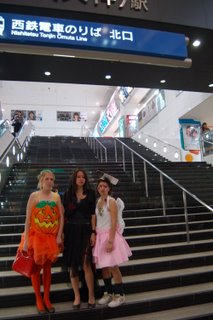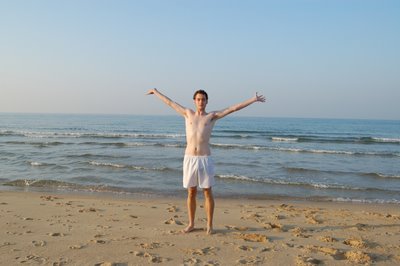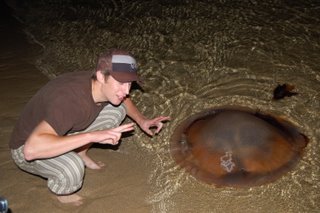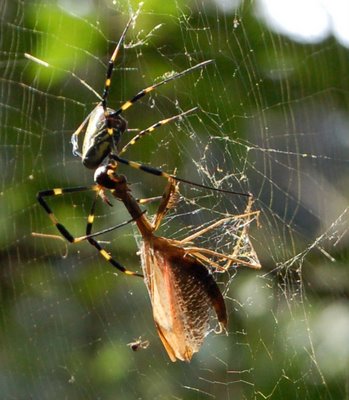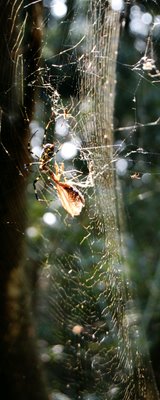
Butoh emerged in Japan in the 1960s, a performance art that sought to delve into humanity, and bring out the bitter news from the inside.
There is no universal technique, form, or training system in Butoh, just a variety of approaches following up on the blackened trail blazed by its founding fathers, Ohno and Hijikata.
It began with a brutal performance in 1959 by Hijikata and Ohno's son, in which a live chicken was killed and brutally smothered, still flapping vainly, between a man's legs. What was originally known as Ankoku Butoh (暗黒舞踏 - 'dance of utter darkness') was born.
The most consistent element of Butoh is the aesthetic - dark, bitter, broken, dirty. Curled wrists, staggering steps, wild eyes, gasping maws.
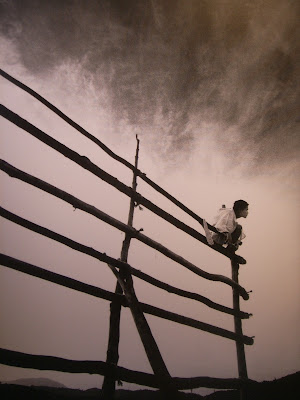
It is the direct opposite of the Japanese Tea Ceremony. Sado (茶道 - 'the way of Tea') is concise, defined, delicate, simple, the height of civilisation; Butoh is wild, improvised, extravagant, and deeply primitive.
Butoh is a reaction against the neat beauty of western contemporary dance, and at the same time a violent disregard for the heavy weight of expectation and decorum in the rigidity of traditional Japanese society.
Though it has gain some notoriety and interest around the world as a shocking performance art, it is largely unheard of in Japan. After I arrived, I asked every likely person I met if they knew of it, but no one had. Eventually, a friend of a friend of a friend put me in touch with someone in a Butoh group, and I went to see the next performance by their teacher, Harada Nobuo.
Dressed in an Aikido outfit as white as his painted face, a middle-aged man lay sleeping on a row of boxes against the wall of a one room art gallery crammed full of 30 people. On the wall behind him, sparkling dots of white light swirled in free patterns, like dancing rain on the sea. The music was quiet but anarchic electro, as disordered as the light show. His body awoke slowly, drifting upwards, eyes closed. His face remained largely serene as his body began to move, swaying and shifting as if blown by an inner breeze. His movements were precise but random, without system or logic. The energy built up and the intensity bloomed, his eyes now open and flashing in the dim light. His thick, hard hands flailed at the air, and then down onto his body. Kneeling before us, his face ran wild as he raked his bare chest with his nails, raising red welts in long trails over his skin. And with that final explosion of violence, his energy subsided and he drifted back to his awkward bed, closing his eyes, and returning to sleep.

Deeply impressed and keen to try it, I made my way to practice the following week. The only native English speaker of the group, an Australian woman called Alana, showed me the way to the rehearsal studio in a large complex in Fukuoka. The room was large and very bare, with all the mirrors covered by curtains. There were four of us; Harada-san the teacher, Alana, a Japanese woman, and myself. We warmed up in a square, guided step-by-step by our teacher. Then we began a pushing exercise, in which one person stands, eyes closed, while a second gently presses their body in different places. With each press, the first person moves with the motion, their body flowing naturally with the energy, before gliding back into place. The aim is fluidity and flexibility; aiming, in Harada's words, to move like seaweed being washed around by the sea's currents. Moving naturally is not easy.
We then swapped places, the pusher become the pushee. I found myself pushing Harada-san's body, whose body flowed and pushed, amid deep breaths like the sea's waves. He is well into his fifties, but his body remains very strong and intimidating from years of intense practice of Butoh, Aikido, and Iai (a particularly hardcore form of fencing conducted with real swords, and focussed, like Butoh, on presence in the moment).
At that moment, a guest appeared in the room. An elderly lady at least in her seventies, accompanied by a translator, came to observe the lesson. A researcher and authority on dance therapy from London, her eyes sparkled as they looked around the room. It was time for performance, and she was keen to join in, stressing her experience of improvised dance. Alana and I would join her in a trio, to last the length of a 12minute track.
So, it was time for my first improvised dance performance. The three of us lined up, a fair distance apart, in a ragged arrangement. The music began, and I was pretty clueless what to do. Worse, I was intensely conscious of not knowing what to do. I began to sway a little, and stopped, stunned by the ridiculousness of what I was doing. I set my shoulders, shut my eyes, and breathed deeply, determined to give this another crack. My body moved a little, and I flowed around the place for a short time. Then I lost my thread, and drooped slowly to the floor. Conscious of the two pairs of Japanese eyes staring at me, I dropped my head to the floor and flumped around. I looked up to see Alana still, arms out, intensely focussed but immobile, while the elderly researcher stood shaking in time to the music, an electrocuted Frankenstein from a 50's horror flick.
Not for the first time in Japan, and certainly not for the last, I thought to myself: 'How on earth did I get here?'
When there's no competition, I guess beginner's luck doesn't come into it.
I've got a long way to go...
Photos:
i) Hijikata Tatsumi, photo
Hiroshi Yamazaki (1998)ii) Hijikata Tasumi by Eikoh Hosoe (1965), from
Kamaitachi, the most beautiful book of Butoh photography I have seen.
iii) Harada Nobuo (2006)
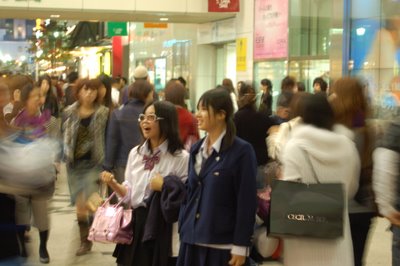 As a gaijin, you possess definite novelty value. In a country where the racial majority makes up 99% of the population, a westerner's height and face immediately marks them out as an outsider. Children wave, strangers say hello, or occasionally just stare. It's almost always extremely friendly, but takes some getting used to.
As a gaijin, you possess definite novelty value. In a country where the racial majority makes up 99% of the population, a westerner's height and face immediately marks them out as an outsider. Children wave, strangers say hello, or occasionally just stare. It's almost always extremely friendly, but takes some getting used to. 